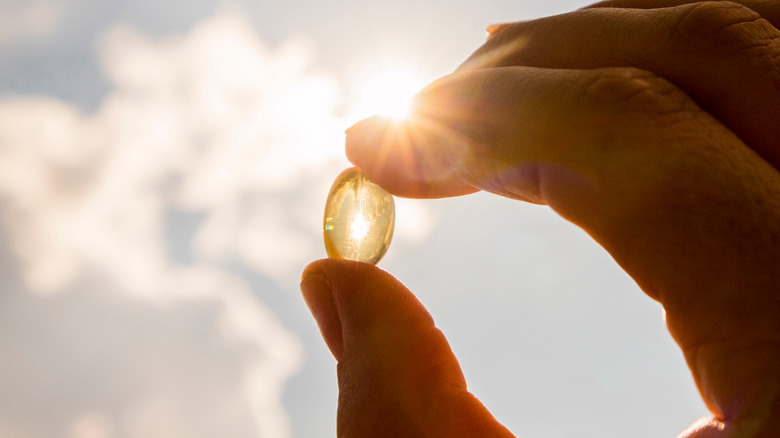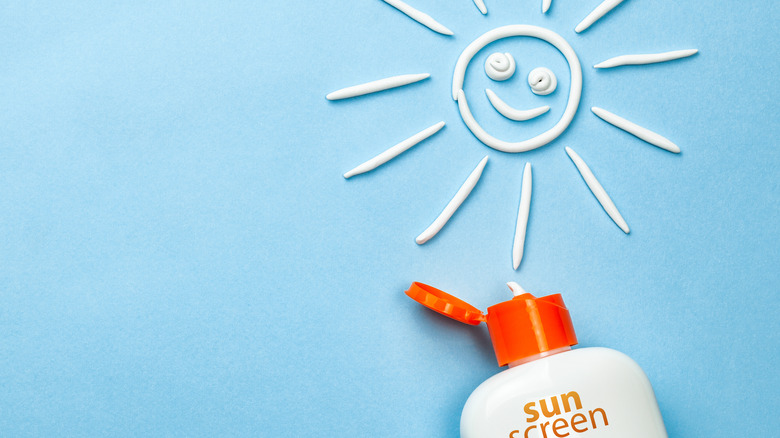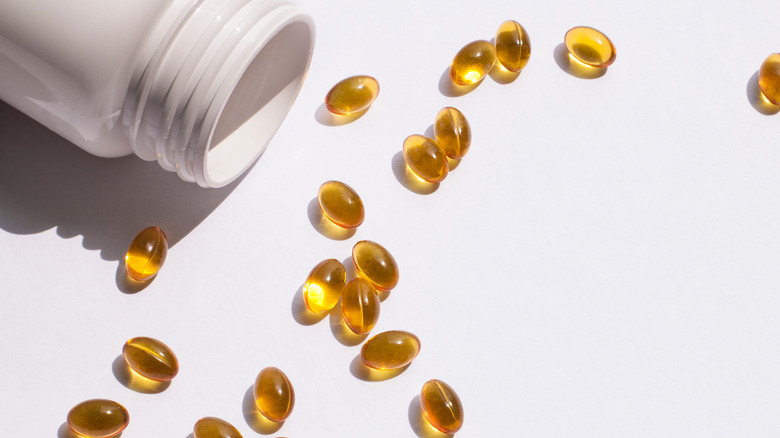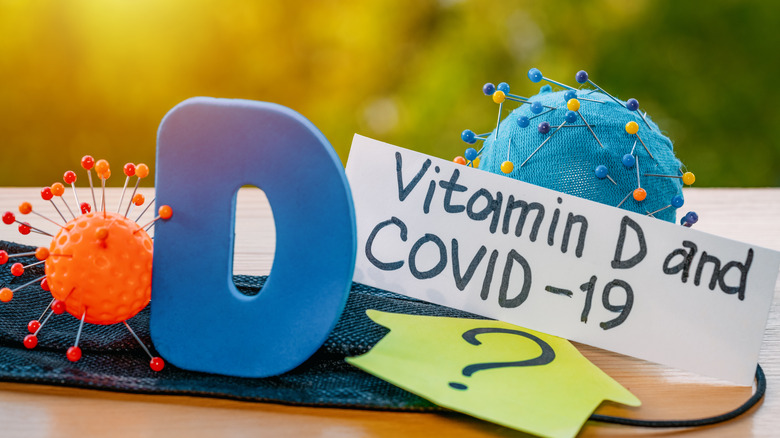Vitamin D Explained: Benefits, Deficiency, And Sources
Vitamins are essential nutrients that our bodies need to perform their usual processes (via Medical News Today). But with a vitamin for seemingly every letter in the alphabet, it can be tough to keep track of what does what. You might want to, though, because these guys all play different roles in your body's functions.
Vitamin D is an incredibly crucial one that you may not think about as often as others like vitamins B and C. This vitamin helps your body absorb phosphorous and calcium, which work together to keep your bones strong and dense (via the Harvard T.H. Chan School of Public Health). The vitamin is also being studied for tons of other potential benefits it might have with bodily processes, like regulating inflammation and controlling insulin sensitivity. According to Harvard Health Publishing, this vitamin wasn't discovered until 1920. However, researchers have come a long way in determining how vital vitamin D is to our health. Keep reading to learn more about where vitamin D comes from, its potential health benefits, and how to spot a deficiency.
The sun's role in vitamin D production
The primary way we get vitamin D in our bodies is not from food, like other vitamins, but from the sun (per Healthline). That's right — that big old ball of heat is responsible for creating the vitamin D our bodies crave. Here's how it works: You step outside. The sun hits your skin. The sun's ultraviolet B (UVB) rays enter your body, targeting cholesterol found in cells. Then, your body transforms that cholesterol into vitamin D. Therefore, simply spending time outdoors could get you the amount of vitamin D your body needs. The problem is that getting too much sunlight can lead to skin-damaging sunburns and sun poisoning, which we definitely don't want.
That's why Yale Medicine dermatologist David J. Leffell suggests not making the sun your primary source of vitamin D. "There are claims that one needs to get a certain amount of sun exposure every day in order to produce enough vitamin D to be healthy. It's just not true. The majority of people can get their vitamin D from nutritional supplements and from vitamin D-fortified foods." Leffell also warns that tanning beds can be a dangerous way to try to get vitamin D, so it's best to avoid them and take a supplement if you're low.
Where else does vitamin D come from?
Aside from the sun, you can get naturally occurring vitamin D from eating a few kinds of foods such as fatty fish (including salmon, tuna, swordfish, sardines), fish oil, egg yolk, and beef liver (Harvard T.H. Chan School of Public Health). Though there aren't that many foods that supply vitamin D naturally, some foods are fortified with the nutrient — these can include cereals, fruit juice, and milk. Mushrooms, especially commercially grown ones that have purposely been exposed to UV light, are also a good source of vitamin D (via Healthline). Eating any of these foods is a good way to get your daily dose of vitamin D if you'd like to avoid the potential risks that come along with sun exposure. Not sure about any of those options, or you don't want to eat them frequently? Supplements might be your answer. Some people need to take vitamin D supplements daily to ensure that they're getting enough in their systems.
What to know about vitamin D supplementation
Humans get their necessary vitamin D from sun exposure, food, and supplements (per Healthline). There are two types of vitamin D supplements: D2 and D3. In nature, vitamin D2 comes from plant sources, like mushrooms and fortified foods, whereas D3 comes from animal sources, like eggs and oily fish. Sunlight also helps the body produce D3, once your skin absorbs UVB rays. Although both kinds of are better than none, research has shown that D3 helps your body maintain vitamin D levels better than D2.
Supplements tend only to be necessary when someone doesn't get enough vitamin D from other sources, which is why it's essential to check with your doctor first before starting a regimen (per WebMD). Vitamin D supplements can result in potentially unsafe side effects, especially when taken unnecessarily. Most notably, they could cause abnormal levels of calcium in the blood. More common and not-as-serious side effects of vitamin D supplements include nausea, fatigue, and dry mouth.
How much vitamin D do I need?
As with other nutrients, it's important for everyone, from infants to seniors, to get enough vitamin D in their diets. But, what constitutes "enough," and how much is too much? The National Institutes of Health Office of Dietary Supplements (NIH) sheds some light on the recommended daily amounts of vitamin D for each age group. For infants, that's 400 international units (IU) each day. Children age one up to adults through age 70 all fall within the same daily recommendation of 600 IU. Pregnant and breastfeeding women should also try to get 600 IU in their daily diets. Those 71 and older should shoot for 800 IU daily. For reference, there's 566 IU of vitamin D in one swordfish serving, and as much as 124 IU in one serving of fortified milk (per Cleveland Clinic).
The NIH also provides maximum amounts of vitamin D for each age group, which could be harmful to your health if exceeded. For infants up to six months in age, that's 1,000 IU, while infants 7-12 months should have no more than 1,500 IU daily. Children 1-3 should stay under 2,500 IU, and children 4-8 should stay under 3,000 IU. For older children, adults, and pregnant and breastfeeding women, the max amount hits 4,000 IU.
Certain factors influence vitamin D levels
There are a few genetic and environmental conditions that can affect how vitamin D gets produced and used by the body. One thing that influences vitamin D levels is melanin, a pigment in the skin that determines its darkness (via WebMD). The amount of melanin your body generates is genetically determined, and people with higher levels of melanin will have darker skin, whereas people with less melanin have lighter skin. According to Harvard Health Publishing, melanin tries to absorb UVB rays just like the skin does, and sometimes will soak the rays up first. When that happens, the body isn't able to latch onto the UVB rays well enough to produce vitamin D from cholesterol, meaning that people with more melanin need longer sun exposure to produce the same amount of vitamin D as someone with less.
Harvard Health Publishing also states that older people are not as efficient as younger people in producing vitamin D. Additionally, weight could play a role in your vitamin D levels. Research from a 2004 study published in the Journal of Clinical Endocrinology and Metabolism found that participants with high body fat mass and body mass indexes (BMI) had lower blood levels of vitamin D than non-obese participants. A more recent scientific review penned in 2017 also found consistent research linking obesity with low vitamin D levels. This is likely because Vitamin D is fat-soluble, meaning that it is stored in the body's fat — so greater amounts of fat will soak up the supply (via Harvard Health Publishing). Sunscreen use can also impact your ability to absorb Vitamin D, though many people don't apply it frequently or liberally enough to totally block UVB rays.
Symptoms of a vitamin D deficiency
When you don't get enough vitamin D through diet, supplements, and sun exposure — or you have a condition that affects the body's production of the vitamin — you could wind up with a vitamin D deficiency (per WebMD). In children, a severe deficiency can lead to rickets, a painful condition that weakens the bones (via NIH). Adults might not experience any symptoms, or those you do notice may be subtle and easily mistaken for symptoms of another condition. According to Cleveland Clinic, common symptoms of vitamin D deficiency include fatigue, muscle cramps, bone pain, and mood changes. If you experience any of these symptoms, especially together, you should consult your doctor.
Harvard Health Publishing explains that a vitamin D deficiency is quite common in the United States, due to a combination of factors that have limited our sun exposure. Some people are exposed to less sunlight due to their geographic location. Office work also keeps people indoors, and increased consciousness about skin cancer has led to more careful sunscreen use. Still, it's better to opt for getting vitamin D in other ways than to risk damaging your skin with too much exposure to UV rays.
Too much vitamin D can be toxic
Though we need to make sure we're getting enough vitamin D daily, we also need to avoid getting too much (per NIH). All people should be careful not to go above the maximum daily recommended amounts of vitamin D, which is 1,000 IU for an infant and 4,000 IU for an adult. Getting too much could lead to symptoms like nausea, excessive thirst, and loss of appetite. Fortunately, it's not possible to get too much vitamin D from the sun alone, as skin naturally avoids making excessive amounts of it.
In more serious cases, too much vitamin D can pose a serious risk to your health. Pediatric endocrinologist Thomas Carpenter tells Yale Medicine that excess vitamin D goes into your bloodstream, which could make you absorb a toxic amount of calcium. This oversaturation of calcium in the blood can lead to kidney stones, kidney failure, bone and muscle weakness, and heart problems such as cardiac arrhythmia (per Mayo Clinic).
Vitamin D might help protect against the COVID-19 virus
Vitamin D is known to keep bones healthy and can potentially improve heart health and boost your mood (per Healthline). There's still a lot to learn about this miracle vitamin, so researchers continue to find links between it and the body. One more recent discovery is the possibility that vitamin D could act as a protectant against the COVID-19 virus. The infectious disease comes from a coronavirus strain that typically causes respiratory illness, but may lead to severe symptoms in those with underlying medical conditions or weak immune symptoms (via World Health Organization).
A March 2021 study published in JAMA Open Network found that Black individuals with higher-than-adequate blood levels of vitamin D had a lower risk of contracting the COVID-19 virus than those with adequate levels (via University of Chicago Medicine). The study didn't yield the same results with white people, but the same research team is leading more clinical trials to learn more. Chief of Hospital Medicine at the UChicago Medicine and lead study author David Meltzer explains, "[The result] supports arguments for designing clinical trials that can test whether or not vitamin D may be a viable intervention to lower the risk of the disease, especially in persons of color."
Vitamin D interacts with some drugs
Vitamin D can interact with some medications, so if you're considering adding a vitamin D supplement to your regimen, be sure to consult with your doctor or pharmacist about how it might affect medicines you're already taking (per NIH). Some medications that are known to interact with vitamin D supplements include weight-loss drug orlistat and common steroidal drugs like prednisone, both of which can lower your vitamin D levels. Taking a thiazide diuretic like Lozol® and Hygroton® along with a vitamin D supplement can cause your blood calcium levels to rise to dangerous levels. Statins, which are prescribed to lower cholesterol levels, might not work properly if taken alongside vitamin D supplements, especially those with high dosages. Oregon State University notes several other drugs and medication types that can interfere with vitamin D supplements, including ketoconazole, rifampin, proton-pump inhibitors, and cell growth inhibitors.
Be sure to tell your doctor everything you're taking, including any over-the-counter products or supplements. Your pharmacist should also have an updated list of your medications as an extra precaution. Your doctor may order blood tests to check your vitamin D levels regularly if you take other medications that may affect the way your body absorbs it (per Medline Plus).
Your vitamin D level has ties to obesity
If you're struggling to lose weight, a vitamin D deficiency could be one of the culprits. Conversely, vitamin D deficiency might be a result of excess weight. A 2011 study published in The American Journal of Clinical Nutrition explored the relationship of participants' 12-month weight loss and their vitamin D blood levels. Results noted a significant mean increase of vitamin D in participants who lost at least 15% of their body weight by the end of the study period. These results indicate that losing weight can increase vitamin D levels in the body. Lead author of the study Caitlin Mason explained in a Fred Hutch interview, "Since vitamin D is generally lower in persons with obesity, it is possible that low vitamin D could account, in part, for the link between obesity and diseases such as cancer, heart disease, and diabetes."
On the other hand, a 2018 study published in the International Journal of Preventative Medicine seems to back up Mason's claim. Researchers led a clinical trial on 50 overweight and obese women, half of whom received high-dose vitamin D supplementation for six weeks. This group of women experienced significant reductions in body mass index, waist circumference, and weight after the trial period compared to the placebo group.
There may be a link between vitamin D and depression
You know that refreshed feeling you get when you step outside on a warm, sunny day? Perhaps unsurprisingly, sun-sourced vitamin D could similarly lift your mood. Research has consistently shown a link between depression and vitamin D deficiency, although the jury is still out whether depression might cause a lack of vitamin D or vice versa.
Still, the results are intriguing. A 2010 author manuscript published in Issues in Mental Health Nursing explores vitamin D supplementation as a potential cost-effective method to improve depression. The authors explain that many groups at risk of vitamin D deficiency, like the elderly and obese individuals, share a risk for depression, and they note that these links should be studied further. Additionally, the manuscript points out other studies discovering relationships between mood and vitamin D, including one which found that a vitamin D deficiency in adults aged 60 to 92 was associated with an active mood disorder.
A 2012 study led by endocrinologist Sonal Pathak followed three women with a vitamin D deficiency and depression (via WebMD). After eight to twelve weeks of vitamin D supplementation, their levels increased to normal ranges. Each women reported having reduced feelings and symptoms of depression at this time, too. And more recently, a 2020 research article backs up the idea that those with vitamin D deficiency and depression seem to get more therapeutic effects from supplementation, though the authors say this connection requires further research.
Vitamin D deficiency may increase cardiovascular risk
If there's one reason to make sure you're getting enough vitamin D in your diet, it's that a deficiency could increase your risk of heart problems (via Johns Hopkins Health). It's important to note, however, that there is not enough research to support the notion that supplementing with vitamin D can lower your risk for a heart attack. That said, research suggests that a Vitamin D deficiency can lead to potential risk factors for cardiovascular issues, like hypertension and coronary artery disease. A 2018 review published in Clinical Hypertension explored and analyzed research on the subject. Studies mentioned in the review found that low vitamin D levels are often found concurrently with conditions like diabetes mellitus, hypertriglyceridemia, myocardial infarction, and obesity — all heart disease risk factors. The review authors also point out evidence from studies showing at least a slight reduction in blood pressure when participants supplemented with vitamin D.
There's still more to learn about the potential side effects of vitamin D
Research is still ongoing to learn more about the potential benefits of Vitamin D. But there's also a lot we still don't know about the possible downfalls or side effects that come along with vitamin D, other than the problems it can cause when it reaches toxic levels in the blood. Rutgers University researchers led a 2019 study published in The Journals of Gerontology: Series A to learn more about cognition as it relates to vitamin D. Participants of the study received one of three dosage levels of vitamin D daily for one year: 600, 2,000, or 4,000 IU. Results concluded that the participants supplementing with 2,000 IU of vitamin D had better cognitive performance than participants with either a lower or higher dosage. And it seemed that the higher dosage could actually cause problems: The group taking 4,000 IU per day of vitamin D had slower reaction times than the lowest dosage group. And as Robert H. Shmerling, senior faculty editor for Harvard Health Publishing, explains, slower reaction times and reduced spatial awareness among the elderly "increase the likelihood of falling and ... reduce one's ability to make quick adjustments if a fall does occur."
Talking to your doctor about vitamin D
It can be tempting to self-diagnose and start supplementing on your own when you think something is off with your body. However, it's always best to talk to your doctor about any concerns before taking vitamins, supplements, or medication. The same holds true with vitamin D.
There is currently no set standard for optimal vitamin D levels — according to Howard LeWine, Editor in Chief of Harvard Health Publishing, "Most experts acknowledge that true vitamin D deficiency is below 12 ng/ml, but this is quite uncommon." LeWine also notes that routine screening for vitamin D has been deemed unnecessary because to date research hasn't established a clear causal relationship between vitamin D deficiency and other conditions with which it's often associated. And as a 2010 article in Mayo Clinic Proceedings states, checking vitamin D serum levels in the blood can be expensive and not always necessary. Therefore, a test is usually only called for if you have a known risk factor for deficiency such as celiac disease, malnourishment, or you take a medication known to reduce your vitamin D levels (via Harvard Health Publishing). Otherwise, your doctor may advise supplementation based on your reported symptoms, diet, and sunlight exposure (via FamilyDoctor.org).















